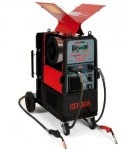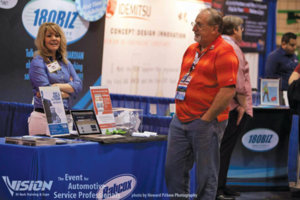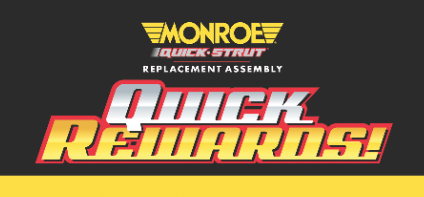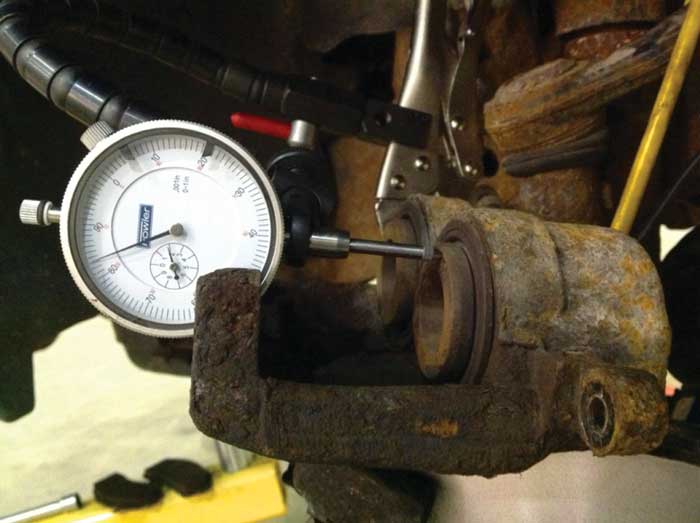I heard “Glen, help!” coming from the phone’s ear piece. It was a customer of mine that I recognized quite well. She was a regular customer, a good customer. It didn’t start off so well though. The first time I remember her bringing her Jeep Cherokee into the shop, the water pump was leaking. She was what you might call a hard sell. I had to explain the problem over and over to her with her giving that “I don’t believe you” look at me, only to have to explain it all over again to her husband on the phone.
Every time she came in, it was like that. Prices itemized, list gone over three times or so, explanation provided over and over and then again to her husband on the phone all over again.
Many of the previous hassles in talking to this lady were about to end with this phone call. She was calling looking to be rescued from car troubles in her garage. Of course, it was a busy day, but I already had work lined up for the techs and I knew they’d be OK for a while, so I grabbed a couple of wrench sizes I figured I’d need and jumped in the shop truck and headed to her house.
I regularly shuttle customers home rather than having someone else do it, so I knew right where she lived. Sure enough, when I got there I saw the funniest thing. There she was with her Jeep inside the garage and she was inside it with her hands on the steering wheel wide eyed and motionless.
The poor lady was scared half senseless. She was locked INSIDE of her Jeep and was scared to move. The Jeep had a very shrill aftermarket alarm system on it. The battery in the remote had died. She got in it and the alarm sounded off inside the small one car garage and it locked the doors.
You know how loud these things can be inside of a repair shop, imagine one going off in a single car parking garage. This lady already struck me as the type that was afraid of her own shadow to begin with. She’d reach for the door and the alarm would warn her — “Chirp! Chirp! Chirp!” — and she’d jump back and freeze again as if the SUV was holding her hostage.
It was all I could do to keep a straight face. I had her pop the hood and with the alarm chirping, I quickly pulled a battery cable loose turning off the alarm. I drove her back to the shop and let her have a seat in the waiting area where she could get a cup of coffee and relax for a minute while the remote’s new battery was being delivered. I popped a new battery in and took her back to her Jeep. When we confirmed that the new battery fixed the alarm problem she followed me back to the shop to square up the tiny bill for the battery. After all that, I didn’t have the heart to charge her for any labor. Besides, it was worth the laughs. And laugh I did, once she got down the road. I’ve seen people lock themselves out of their car several times. I’m not too proud to admit I’ve done it to myself before.
But that was the first and only time I’ve ever seen anyone locked inside of their car! The next day her husband called me from somewhere up in New York (I’m in South Carolina) to thank me for helping her out when he felt a lot of people would have told her to call a wrecker service. After that, things just clicked. There was no more multiple explanations. If her vehicle was in need of repair or maintenance, it was just a simple “How much?” then a simple “Ok, do it.” Later, that even changed to having a preset “OK” up to $200. In my area, that is rare.
This customer started off as a very untrusting customer. She was the type that would get under most anyone’s skin. She required a lot of patience in the beginning — multiple explanations, she wanted to keep a copy of the estimate herself, she had to talk to her husband and then I had to talk to her husband. She even wanted to see and have (whenever possible) the old parts.
Since I had nothing to hide, I had nothing to fear, but it was rather aggravating dealing with her in the beginning. But all it took was a little extra time invested to slow down and explain things in detail, as well as the patience to not tell her off and say something like “If you don’t trust me, leave.”
Several months after I left that shop, I ran into her in a local Wal-Mart. She told me that she doesn’t go to that shop anymore. Her exact words were: “They’re not very nice over there anymore.” I took that to mean that she wore someone’s patience thin. Or rather, someone LET her wear their patience thin and likely got a bit gruff with her (or that she perceived them as being gruff). Either way, she doesn’t spend money there anymore.
Something like that can happen quite unintentionally and unbeknownst to any repair shop. Most of it just comes down to a simple clash of personalities.
On a very basic level of looking at people’s personalities, one could group most anyone onto one of four basic groups; Amiable, Analytical, Expressive and Driver. The lady with the Jeep was most certainly an Amiable person.
Amiable: The amiable person acts like they are scared of their own shadow. They will usually ask a lot of questions including “what would you do?” They will usually use the word “feel” in place of “think.”
They will seem withdrawn from everyone at first, but if they decide that they are comfortable with someone they will cling to them. They will be slow to make a decision because they will first have to call their dad, mom, grandparent or friends. They will usually make their repair decision based on feedback from a trusted friend or relative. If they are unhappy with your repair shop, they will nearly never complain, they just won’t come back. They see Drivers as rude and Expressive persons as loud. They are similar in many ways to the Analytical person.
Analytical: The analytical person wants all estimates itemized. This person will ask for detailed information about what happened to their car and will most likely ask you to fax a copy of the bill over. Don’t expect a fast answer. They will call around, compare costs against blue-book value and/or your competitor’s prices.
They will usually make their repair decision based on numbers that surround the job such as cost, vehicle worth, and if they think your price is “in line” with what other repair shops are getting for the similar service. If they are unhappy with your repair shop, they might not complain. If they do, they will likely to do it over the phone, through e-mail, or some other media that allows them to avoid a one-on-one confrontation.
Their argument will likely be backed by numbers of some sort. They see drivers as rude and expressive persons as loud. They are similar in many ways to the Amiable person.
Driver: The Driver is the person who acts like they are in a hurry. This person does not want a lot of detail and might say “what’s the bottom line.” What’s wrong with it (the condensed version), when will it be ready, and the price are the three main things they want to hear.
They will make a lot of their repair decision based on how it works in their personal schedule. They will be the least understanding of all others if the vehicle is not ready when promised. If they are unhappy with your business, they are the type to, usually, be professional about it and take their discussion behind a closed office door before getting loud about it. They see the Amiable persons as wimps and Analytical persons as anal-retentive.
Expressive: The Expressive person likes to talk about their last fishing trip or ask how your family is doing before telling you what is wrong with their car.
Often, the person will use a lot of hand gestures while speaking. They will change the subject on you while you are trying to make your sale. Also, they don’t like a lot of technical information, they get bored with it. They will often want to socialize and then jump almost straight to the price from that point.
Your social skills will play a major role in the sale. If they are happy with your service, they will act like your best friend, but if they are unhappy, they will display it right in your lobby in front of everyone. They see the Amiable persons as withdrawn and Analytical persons as anal-retentive.
Now, here’s the kicker. Although it seems there are some people who adopt one main personality and stick to it, many (if not most) float around in some of these different areas. For example, someone might be a Driver at work and an Expressive when watching their favorite football team and then become an analytical when they bring their car in for repairs. When I speak to a client, I am not trying to “pigeon-hole” or label someone’s personality on a grand scale.
Not only am I not qualified to do so (no psychology degree here), it just doesn’t matter to me what they are like the rest of the day. I’m only concerned about the few minutes out of the day that I am speaking to them as my customer.
You know the “birds of a feather” expression. I simply want the customer to feel comfortable. My approach is to float between these four personas, somewhat.
This doesn’t require large personal changes, just a few subtle ones. For example; when speaking to an Analytical or Amiable person, a softer tone of voice is appropriate. A firm sounding tone can make you appear overbearing to them. However, when speaking to a Driver or an Expressive person, a firm tone is appropriate.
Using too soft of a tone will appear to them as if you lack confidence in your own words and actions.
Body language plays a large role as well. An Expressive person likes lots of hand gestures. Analytical persons like for you to point to what you are talking about. Amiable people prefer your hands and arms to have a more open appearance. If you use too many hand gestures in front of a Driver, you may appear as a clown to them.
Stance plays a large role in body language as well. When standing in front of someone and talking to them, don’t stand with both feet perfectly side by side. Instead, stand with your feet diagonally so that one foot is slightly farther forward than the other.
When speaking to an Analytical or Amiable person, shift your body weight toward the rear foot. This backs your body away from them slightly to give them space, and to not feel crowed or rushed that leaning on the forward foot would do. However, when speaking to a Driver or Expressive person, shift your weight to the forward foot. This tells the Driver that you are ready to move forward and do what is needed and the Expressive doesn’t think you are trying to distance yourself from them.
If you were to lean to your rearward foot, then the Driver will take that as a lack of self confidence and the Expressive may take it personal toward them.
People can be a regular Rubik’s Cube, a few turns here or there and their “colors” change all around. Just because someone is in a hurry one day and comes into your shop as a Driver, doesn’t mean they will be pushy every day you see them. But when they are in a hurry, for one reason or another, they need for you to show that same level of concern and act in a manner that shows them you are prepared to get down to business and get their needs met. A person who is Amiable in nature, however, might feel that you are “not very nice” if you took that same approach with them as you would the Driver type of person. So a shift in personal actions are needed from one person to another. One size does not fit all.
A good service advisor, or whomever in your shop is acting as a service advisor at that moment, can make any of these different people feel that you are a “bird” of their same “feather,” and therefore feel more comfortable.





